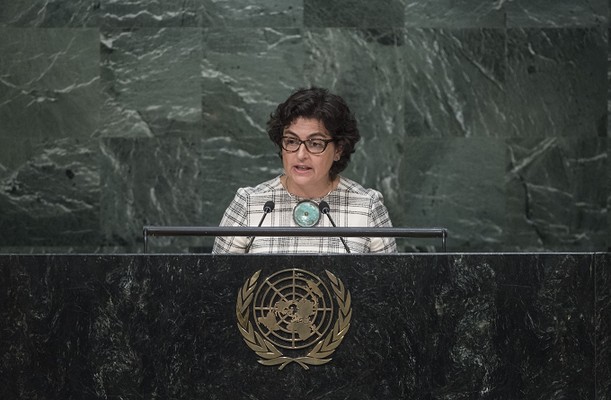
ITC head calls on UN General Assembly to support SMEs for Global Goals
26 September 2015
New York
Mr. President
Mr. Secretary-General
Distinguished Delegates
Ladies and Gentlemen
We know why we are here. We know what is at stake. This new global agenda has the potential to set us on track towards a future of equality and opportunity for the billions of women, men, and young people who have not shared fully in our rising prosperity. This inclusive future will be greener or it will not happen, since business as usual on the environmental front will exact terrible economic and social costs, especially from the poorest.
Adopting this 2030 Agenda for Sustainable Development is a first step. Translating the promise of these marching orders into reality will demand determined policies. It will require fundamental changes in the way the private sector does business. We as individual consumers will also have to make more responsible decisions.
Implementing the agenda will ultimately lead to incredible economic and human savings. But there will be up-front costs. We will need an intelligent mix of traditional development assistance, domestic resource mobilization, and private sector participation to get us there. Leveraging every cent of aid, tax revenue, and private investment for maximal development impact will take a strong partnership between governments, business, and civil society working together with the United Nations.
And we will need innovation. The low-carbon transition will be incomplete unless it extends access to energy to the billion-plus people who still rely on wood for heat and light.
But delivering on the 2030 Agenda is not just about finding new ways to do things. It is about capitalizing on what we already know to be effective. And that is why it is so heartening to see that the Agenda recognizes trade as an “engine for development.”
As we work to eradicate extreme poverty by 2030, we will be building on three decades that have seen the fastest poverty reduction in history. And the growth that lifted hundreds of millions of people out of poverty across large sections of the developing world had much to do with trade. It had much to do with engagement in a more open global economy.
The countries that have shared the least in recent human development gains – the countries that have fallen short on reducing poverty – are precisely those that have remained on the margins of international production networks.
To put it simply, trading in value-added goods and services matters for development. A global economy in which no country languishes on the sidelines, or remains locked in unprocessed raw materials, will be better placed to offer productive employment opportunities for all.
The 2030 Sustainable Development Agenda, like the Millennium Development Goals before it, will catalyze new thinking and funds aimed at meeting its targets. I am delighted that some of this ingenuity will now be directed towards trade inclusion. Towards objectives such as doubling least developed countries’ share in world trade, promoting economic diversification and promoting the economic empowerment of women. And critically, towards accurately measuring the effectiveness of our interventions.
The agenda calls for trade opening, for farm and fishery subsidy reform and for a strengthened multilateral trading system anchored firmly within the World Trade Organization. It directly links Aid for Trade to the goal of full and productive employment for all.
Trade is not an end in itself – it is a road towards growth and development. It is an enabler of progress across the entire agenda and in particular to the goals of creating jobs and reducing inequality.
I want to point to small and medium-sized enterprises, as a vital link for making growth inclusive. SMEs account for the majority of jobs in virtually all countries. Keeping up with population growth will require the world to generate an additional 500 million jobs by 2030. In many places, these jobs will mean the difference between a demographic dividend and a social time bomb. And the lion’s share of these jobs will be generated by SMEs.
When SMEs are able to access finance, build trade capacity and skills, when they are empowered to become more competitive and connect to international markets - in a nutshell, when SMEs trade - they generate more and better jobs, across a broad cross section of countries’ workforces. When these SMEs are run by women, the dividends are richer still.
In sum, SMEs are the missing link for inclusive growth.
As we turn our minds to making this ambitious agenda a reality, let us think about how to integrate SMEs in developing countries more fully into the global division of labour. Let us empower them and transform them into the vectors of growth that they can be. The International Trade Centre is your partner in this endeavour and we are honoured to be part of this new chapter in our collective story.
I thank you.



